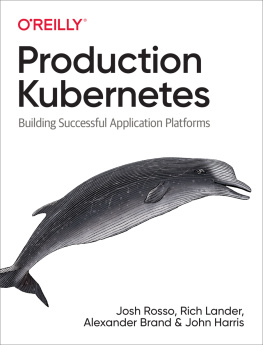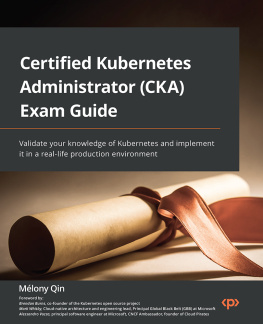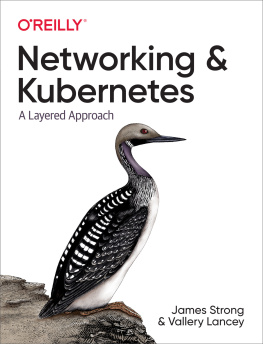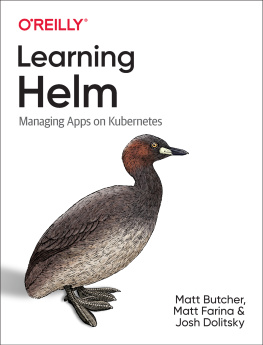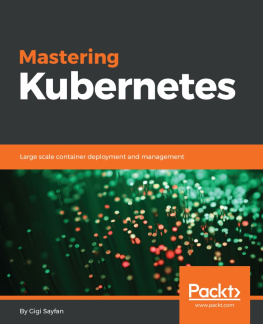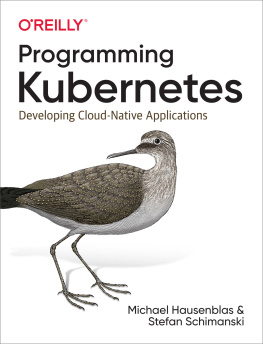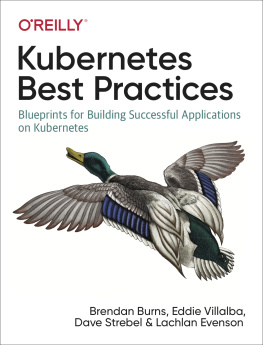Josh Rosso - Production Kubernetes
Here you can read online Josh Rosso - Production Kubernetes full text of the book (entire story) in english for free. Download pdf and epub, get meaning, cover and reviews about this ebook. year: 2021, publisher: OReilly Media, Inc., genre: Home and family. Description of the work, (preface) as well as reviews are available. Best literature library LitArk.com created for fans of good reading and offers a wide selection of genres:
Romance novel
Science fiction
Adventure
Detective
Science
History
Home and family
Prose
Art
Politics
Computer
Non-fiction
Religion
Business
Children
Humor
Choose a favorite category and find really read worthwhile books. Enjoy immersion in the world of imagination, feel the emotions of the characters or learn something new for yourself, make an fascinating discovery.
- Book:Production Kubernetes
- Author:
- Publisher:OReilly Media, Inc.
- Genre:
- Year:2021
- Rating:3 / 5
- Favourites:Add to favourites
- Your mark:
- 60
- 1
- 2
- 3
- 4
- 5
Production Kubernetes: summary, description and annotation
We offer to read an annotation, description, summary or preface (depends on what the author of the book "Production Kubernetes" wrote himself). If you haven't found the necessary information about the book — write in the comments, we will try to find it.
Production Kubernetes — read online for free the complete book (whole text) full work
Below is the text of the book, divided by pages. System saving the place of the last page read, allows you to conveniently read the book "Production Kubernetes" online for free, without having to search again every time where you left off. Put a bookmark, and you can go to the page where you finished reading at any time.
Font size:
Interval:
Bookmark:

by Josh Rosso , Rich Lander , Alexander Brand , and John Harris
Copyright 2021 Josh Rosso, Rich Lander, Alexander Brand, and John Harris. All rights reserved.
Printed in the United States of America.
Published by OReilly Media, Inc. , 1005 Gravenstein Highway North, Sebastopol, CA 95472.
OReilly books may be purchased for educational, business, or sales promotional use. Online editions are also available for most titles (http://oreilly.com). For more information, contact our corporate/institutional sales department: 800-998-9938 or corporate@oreilly.com .
- Acquisitions Editor: John Devins
- Development Editor: Jeff Bleiel
- Production Editor: Christopher Faucher
- Copyeditor: Kim Cofer
- Proofreader: Piper Editorial Consulting, LLC
- Indexer: Ellen Troutman
- Interior Designer: David Futato
- Cover Designer: Karen Montgomery
- Illustrator: Kate Dullea
- March 2021: First Edition
- 2021-03-16: First Release
See http://oreilly.com/catalog/errata.csp?isbn=9781492092308 for release details.
The OReilly logo is a registered trademark of OReilly Media, Inc. Production Kubernetes, the cover image, and related trade dress are trademarks of OReilly Media, Inc.
The views expressed in this work are those of the authors, and do not represent the publishers views. While the publisher and the authors have used good faith efforts to ensure that the information and instructions contained in this work are accurate, the publisher and the authors disclaim all responsibility for errors or omissions, including without limitation responsibility for damages resulting from the use of or reliance on this work. Use of the information and instructions contained in this work is at your own risk. If any code samples or other technology this work contains or describes is subject to open source licenses or the intellectual property rights of others, it is your responsibility to ensure that your use thereof complies with such licenses and/or rights.
This work is part of a collaboration between OReilly and VMware Tanzu. See our statement of editorial independence.
978-1-492-09230-8
[LSI]
It has been more than six years since we publicly released Kubernetes. I was there at the start and actually submitted the first commit to the Kubernetes project. (That isnt as impressive as it sounds! It was a maintenance task as part of creating a clean repo for public release.) I can confidently say that the success Kubernetes has seen is something we had hoped for but didnt really expect. That success is based on a large community of dedicated and welcoming contributors along with a set of practitioners who bridge the gap to the real world.
Im lucky enough to have worked with the authors of Production Kubernetes at the startup (Heptio) that I cofounded with the mission to bring Kubernetes to typical enterprises. The success of Heptio is, in large part, due to my colleagues efforts in creating a direct connection with real users of Kubernetes who are solving real problems. Im grateful to each one of them. This book captures that on-the-ground experience to give teams the tools they need to really make Kubernetes work in a production environment.
My entire professional career has been based on building systems aimed at application teams and developers. It started with Microsoft Internet Explorer and then continued with Windows Presentation Foundation and then moved to cloud with Google Compute Engine and Kubernetes. Again and again Ive seen those building platforms suffer from what I call The Platform Builders Curse. The people who are building the platforms are focused on a longer time horizon and the challenge of building a foundation that will, hopefully, last decades. But that focus creates a blind spot to the problems that users are having right now. Oftentimes we are so busy building a thing we dont have the time and problems that lead us to actually use the thing we are building.
The only way to defeat the platform builders curse is to actively seek information from outside our platform-builder bubble. This is what the Heptio Field Engineering team (and later the VMware Kubernetes Architecture TeamKAT) did for me. Beyond helping a wide variety of customers across industries be successful with Kubernetes, the team is a critical window into the reality of how the theory of our platform is applied.
This problem is only exacerbated by the thriving ecosystem that has been built up around Kubernetes and the Cloud Native Computing Foundation (CNCF). This includes both projects that are part of the CNCF and those that are in the larger orbit. I describe this ecosystem as beautiful chaos. It is a rainforest of projects with varying degrees of overlap and maturity. This is what innovation looks like! But, just like exploring a rainforest, exploring this ecosystem requires dedication and time, and it comes with risks. New users to the world of Kubernetes often dont have the time or capacity to become experts in the larger ecosystem.
Production Kubernetes maps out the parts of that ecosystem, when individual tools and projects are appropriate, and demonstrates how to evaluate the right tool for the problems the reader is facing. This advice goes beyond just telling readers to use a particular tool. It is a larger framework for understanding the problem a class of tools solves, knowing whether you have that problem, being familiar with the strengths and weaknesses to different approaches, and offering practical advice for getting going. For those looking to take Kubernetes into production, this information is gold!
In conclusion, Id like to send a big Thank You to Josh, Rich, Alex, and John. Their experience has made many customers directly successful, has taught me a lot about the thing that we started more than six years ago, and now, through this book, will provide critical advice to countless more users.
Joe Beda
Principal Engineer for VMware Tanzu, Cocreator of Kubernetes,
Seattle, January 2021
Kubernetes is a remarkably powerful technology and has achieved a meteoric rise in popularity. It has formed the basis for genuine advances in the way we manage software deployments. API-driven software and distributed systems were well established, if not widely adopted, when Kubernetes emerged. It delivered excellent renditions of these principles, which are foundational to its success, but it also delivered something else that is vital. In the recent past, software that autonomously converged on declared, desired state was possible only in giant technology companies with the most talented engineering teams. Now, highly available, self-healing, autoscaling software deployments are within reach of every organization, thanks to the Kubernetes project. There is a future in front of us where software systems accept broad, high-level directives from us and execute upon them to deliver desired outcomes by discovering conditions, navigating changing obstacles, and repairing problems without our intervention. Furthermore, these systems will do it faster and more reliably than we ever could with manual operations. Kubernetes has brought us all much closer to that future. However, that power and capability comes at the cost of some additional complexity. The desire to share our experiences helping others navigate that complexity is why we decided to write this book.
You should read this book if you want to use Kubernetes to build a production-grade application platform. If you are looking for a book to help you get started with Kubernetes, or a text on how Kubernetes works, this is not the right book. There is a wealth of information on these subjects in other books, in the official documentation, and in countless blog posts and the source code itself. We recommend pairing the consumption of this book with your own research and testing for the solutions we discuss, so we rarely dive deeply into
Font size:
Interval:
Bookmark:
Similar books «Production Kubernetes»
Look at similar books to Production Kubernetes. We have selected literature similar in name and meaning in the hope of providing readers with more options to find new, interesting, not yet read works.
Discussion, reviews of the book Production Kubernetes and just readers' own opinions. Leave your comments, write what you think about the work, its meaning or the main characters. Specify what exactly you liked and what you didn't like, and why you think so.

